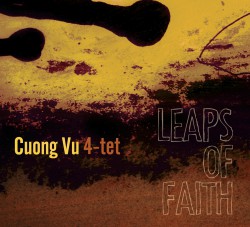MUSIC REVIEW BY Jerry D'Souza, All About Jazz
Over the last 10 years, trumpeter Cuong Vu has made an impact as an innovator who filters music through the prism of his imagination. He has been agile enough to fit into bands as diverse as those led by Myra Melford and Pat Metheny, and has also carved a niche for himself as a leader who turns his compositions into distinctive portraits of startling imagery. On Leaps of Faith, he focuses his attention on three jazz standards, two pop tunes and three originals.
Vu's proclivity for the unusual can be witnessed in the lineup, which also includes two electric bassists and a drummer. The basses go beyond being rhythm instruments, extrapolating the role of the instrument to add layers of enticing textures.
"Body and Soul" gets a lyrical wash from Vu. His lines are crystalline and precise, as they sail and soar with an encompassing passion. He stays in that realm except for a quick acknowledgment of the roiling bed set up by bassists Stomu Takeishi and Luke Bergman. The atmosphere is different, however, on "All the Things You Are," where Vu balances gentle permutations with free interjections, using subtle weaves and a few broad strokes to shape the tune's dynamics and character. Drummer Ted Poor embellishes the beat with a spry approach that says as much through space as it does through accents.
The tempo of "Something" is pulled back for a lingering, aching look, until Vu raises the tune to a swell and improvises on the melody. It is now a full-blooded yearning, with an iridescent spark before it settles once again into a contemplative mood. The changes are electrifying.
"Leaps of Faith" blends several stylistic founts. Rock and heavy metal are seen in this visionary blend. Vu lets volatile shards erupt from his trumpet, adds smears and drives the momentum atop the whoop of the bass and the complex structures of the drums. All of the players are of a mindset that propels innovation to dizzying heights.
The expansive "I Shall Never Come Back" underlines the virtuosity of the band. Improvisation is kicked into high gear by Takeishi and Bergman in a welter of feedback, while Poor opens an arsenal of rhythm. Vu dwells on the melody, and then propels that into a volcanic eruption in a swirling cluster of sound. Power finds its glory in this rich complexity of rhythm.
As before, Vu stamps his authority on his original material, but adds another notch to his creative flair through the finesse he brings to the covers.
Vu's proclivity for the unusual can be witnessed in the lineup, which also includes two electric bassists and a drummer. The basses go beyond being rhythm instruments, extrapolating the role of the instrument to add layers of enticing textures.
"Body and Soul" gets a lyrical wash from Vu. His lines are crystalline and precise, as they sail and soar with an encompassing passion. He stays in that realm except for a quick acknowledgment of the roiling bed set up by bassists Stomu Takeishi and Luke Bergman. The atmosphere is different, however, on "All the Things You Are," where Vu balances gentle permutations with free interjections, using subtle weaves and a few broad strokes to shape the tune's dynamics and character. Drummer Ted Poor embellishes the beat with a spry approach that says as much through space as it does through accents.
The tempo of "Something" is pulled back for a lingering, aching look, until Vu raises the tune to a swell and improvises on the melody. It is now a full-blooded yearning, with an iridescent spark before it settles once again into a contemplative mood. The changes are electrifying.
"Leaps of Faith" blends several stylistic founts. Rock and heavy metal are seen in this visionary blend. Vu lets volatile shards erupt from his trumpet, adds smears and drives the momentum atop the whoop of the bass and the complex structures of the drums. All of the players are of a mindset that propels innovation to dizzying heights.
The expansive "I Shall Never Come Back" underlines the virtuosity of the band. Improvisation is kicked into high gear by Takeishi and Bergman in a welter of feedback, while Poor opens an arsenal of rhythm. Vu dwells on the melody, and then propels that into a volcanic eruption in a swirling cluster of sound. Power finds its glory in this rich complexity of rhythm.
As before, Vu stamps his authority on his original material, but adds another notch to his creative flair through the finesse he brings to the covers.
Soundclips
Other Reviews of
"Leaps of Faith":
Bird Is The Worm Jazz Blog by Dave Sumner
Cadence by Phillip McNally
All About Jazz by Ian Patterson
Jazziz by Shaun Brady
Downbeat Magazine by Peter Margasak
Jazz Times by Steve Greenlee
New York City Jazz Record by Matthew Miller
Rifftides by Doug Ramsey
All Music Guide by Adam Greenberg
JazzReview.com by John Barron
New York Times by Nate Chinnen
All About Jazz.com by C. Michael Bailey
